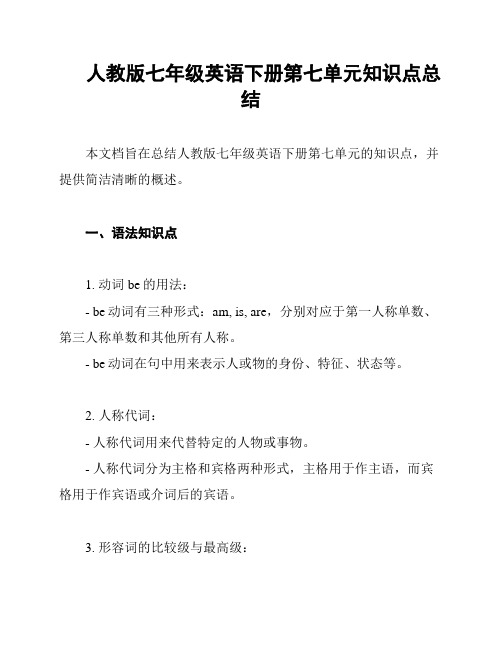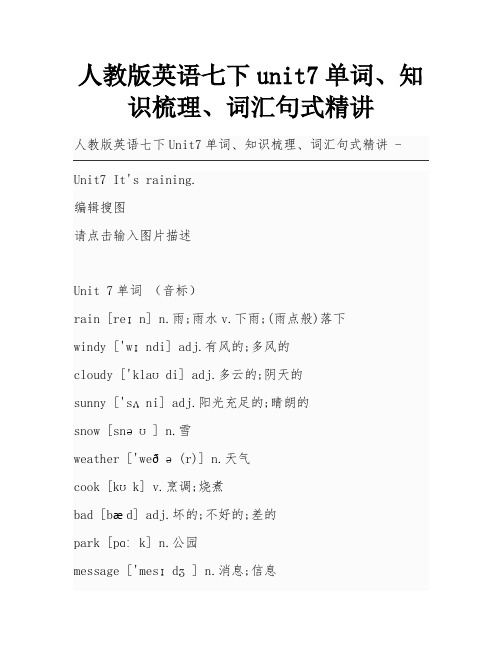初中英语七年级下册Unit 7 单元重点语法
七年级下册英语unit7知识点总结

七年级下册英语unit7知识点总结Unit 7的主要内容是关于地理和旅游方面的词汇及句型。
在这个单元里,我们将学习如何询问地点、问路、谈论交通工具、描述旅游景点并提出建议等。
一、地点询问地点:1. Excuse me, where is the …? (对不起,请问……在哪里?)指路:2. Go straight on. (一直直走)3. Turn left/right. (向左/右转)4. It’s on your left/right. (在你的左边/右边)二、交通交通工具:2. bus (公共汽车)3. taxi (出租车)4. bike (自行车)5. subway (地铁)交通工具的用法:1. take the train/bus/subway (乘坐火车/公共汽车/地铁)2. catch a taxi (打出租车)3. ride a bike (骑自行车)三、景点旅游景点:1. museum (博物馆)2. park (公园)3. beach (海滩)5. river (河流)描述旅游景点:1. It’s a beautiful/interesting place. (这是一个美丽/有趣的地方)2. There are lots of things to see/do here. (这里有很多东西可以看/做)3. It’s worth a visit. (值得一游)提出建议:1. Why don’t we …? (为什么不……?)2. We could … (我们可以……)3. How about …? (……怎么样?)本单元的语法重点为情态动词should和can的用法,学生需要掌握其肯定、否定和疑问句形式的构成及用法。
1. should/can/must + 动词原形2. should not/cannot/must not + 动词原形3. 询问意愿:Can/Will you …? / Would you like to …?总结:正如以上所述,七年级下册英语unit7主要是涉及到了生活中的地理和旅游类的词汇和句型,包括询问地点、问路、谈论交通工具、描述旅游景点并提出建议等。
人教版七年级英语下册第七单元知识点总结

人教版七年级英语下册第七单元知识点总结本文档旨在总结人教版七年级英语下册第七单元的知识点,并提供简洁清晰的概述。
一、语法知识点1. 动词be的用法:- be动词有三种形式:am, is, are,分别对应于第一人称单数、第三人称单数和其他所有人称。
- be动词在句中用来表示人或物的身份、特征、状态等。
2. 人称代词:- 人称代词用来代替特定的人物或事物。
- 人称代词分为主格和宾格两种形式,主格用于作主语,而宾格用于作宾语或介词后的宾语。
3. 形容词的比较级与最高级:- 比较级用来对两个事物进行比较,最高级则用来对多个事物进行比较。
- 形容词的比较级一般在词尾加-er,最高级在词尾加-est。
- 有些形容词的比较级和最高级形式不规则,需要特别记忆。
二、词汇知识点1. 家庭成员:- 爸爸:father- 妈妈:mother- 哥哥:brother- 姐姐:sister- 弟弟:younger brother- 妹妹:younger sister2. 学校设施:- 图书馆:library- 实验室:laboratory- 体育馆:gymnasium- 教室:classroom- 游泳池:swimming pool三、交际用语1. 问候与告别:- 问候:Hello! / How are you?- 回答:I'm fine, thank you. / Not very well.- 告别:Goodbye! / See you later.2. 自我介绍:- My name is [姓名]. I am [年龄] years old. I am from [国家/城市].3. 询问与回答:- 询问:What's your name? / How old are you?- 回答:My name is [姓名]. / I am [年龄] years old.以上为人教版七年级英语下册第七单元的主要知识点总结,希望对您的学习有所帮助。
七年级英语下册unit7知识点

七年级英语下册unit7知识点Unit 7 of seventh grade English textbook focuses on describing past events and situations using the past simple tense. It also introduces some useful expressions to describe past experiences and offers opportunities for students to learn and practice using the target language. Here are the main knowledge points covered in Unit 7:1. Past Simple TenseThe past simple tense is used to describe finished actions, situations or events that happened at a specific time in the past. It is formed differently depending on the verb type:Regular verbs: add -ed to the base form of the verb (e.g. walk - walked, watch - watched)Irregular verbs: the past tense is formed in various ways, some verbs have different spelling, some use the same word as the base form (e.g. go - went, eat - ate)Negative sentences are formed using the auxiliary verb "did" in the past simple and the base form of the main verb (e.g. I didn't eat breakfast this morning.)Questions are formed using the auxiliary verb "did" and the base form of the main verb (e.g. Did you watch the TV last night?)2. Time expressionsIn order to give more precise information about when an event happened, certain expressions are used such as:Yesterday, the day before yesterday, last week, last month, last year, two days ago, ten minutes ago3. Useful expressions to describe past experiencesTo describe past experiences, some useful expressions can be used, including:I had a great time, it was fantastic/amazing, I enjoyed myself, It was fun, I loved it4. Listening and speaking practiceIn Unit 7, students have the opportunity to listen to and speak about past events using the past simple tense. They are guided through a series of activities that involve listening to people describe their past experiences and then sharing their own. Students are encouraged to use new vocabulary and expressions they have learned to describe their experiences.5. Reading and writing practiceIn the reading and writing section, students are asked to read a short story and answer comprehension questions, as well as write a paragraph about a personal experience. This provides students with an opportunity to practice their reading and writing skills, as well as using the target language to describe past events.ConclusionUnit 7 of the seventh grade English textbook provides students with a useful and practical introduction to using the past simple tense to describe past events and experiences. By practicing listening, speaking, reading, and writing, students will be able to gain the confidence and skills necessary to communicate effectively in English.。
人教版英语七下unit7单词、知识梳理、词汇句式精讲

人教版英语七下unit7单词、知识梳理、词汇句式精讲Unit7 It's raining.编辑搜图请点击输入图片描述Unit 7单词(音标)rain [reɪn] n.雨;雨水v.下雨;(雨点般)落下windy ['wɪndi] adj.有风的;多风的cloudy ['klaʊdi] adj.多云的;阴天的sunny ['sʌni] adj.阳光充足的;睛朗的snow [snəʊ] n.雪weather ['weðə(r)] n.天气cook [kʊk] v.烹调;烧煮bad [bæd] adj.坏的;不好的;差的park [pɑːk] n.公园message ['mesɪdʒ] n.消息;信息him [hɪm] pron.他(he的宾格)could [kə d aux.可以;能;可能;can的过去式back [bæk] n.后面adj.向后的;后面的problem ['prɒbləm] n.问题;难题again [ə'ɡen] adv.再;又dry [draɪ] adj.干的;干燥的cold [kəʊld] adj.冷的;寒冷的hot [hɒt] adj.热的;辣的warm [wɔːm] adj.温暖的;暖和的visit ['vɪzɪt] v.拜访;参观Canada ['kænədə] n.加拿大summer ['sʌmə(r)] n.夏天;夏季sit [sɪt] v.坐juice [dʒuːs] n.果汁soon [suːn] adv.不久;很快vacation [və'keɪʃn] n.假期;休假hard [hɑːd] adj.硬的;困难的Europe ['jʊərəp] n.欧洲;欧盟mountain ['maʊntən] n..山;山脉;高山country ['kʌntri] n.国家;乡村skate [skeɪt] v.溜冰;滑冰snowy ['snəʊi] adj.多雪的winter ['wɪntə(r)] n.冬季;冬天Russian ['rʌʃn] adj.俄国的;俄国人的;俄语的snowman ['snəʊmæn] n.雪人rainy ['reɪni] adj.多雨的;下雨的Unit7 知识梳理【重点短语】1.How is the weather...?=What’s the weather like...? 天气怎么样?the rainy weather 在雨天3.talk about the weather with friends 和朋友谈论天气4.play puter games 玩电脑游戏5.watch TV 看电视6.How’s it going? 一切还好么?7.not bad 不坏,不错8. at the park= in the park 在公园9.sound like 听起来像10.have a good time 玩得开心;过得愉快11.study at sb’s home 在某人的家中学习12. take a message for sb. 为某人带消息13. tell sb. to do sth. 告诉某人做某事14. call sb. back (给某人)回电话15. no problem 没问题16. do one’s homework 做某人的作业17. right now 现在;立即;马上18. study English 学习英语19. have a great time doing 开心做某事20. summer school 暑期学习班21. visit some of my old friends 拜访我的一些老朋友22. be happy to do sth. 高兴做某事23. sit by the pool 坐在游泳池边24. drink orange juice 喝橙汁25. summer vacation 暑假26. study hard 努力学习27. be on vacation 在度假28. write to sb. 给某人写信29. in your country 在你的国家30. next month 下个月31. for three hours 三个小时32. wear hats 戴帽子33. take a photo of sb. 给某人照相34. speak to sb. 给某人谈话【重点句型】1. Hello,Rick speaking.喂,我是里克。
七年级下册第七单元英语知识点

七年级下册第七单元英语知识点一、重点词汇1. season 季节2. spring 春天3. summer 夏天4. autumn 秋天5. winter 冬天6. favorite 最喜欢的7. why 为什么8. because 因为9. plant 种植10. snow 雪11. ice 冰12. rain 雨13. sun 太阳14. cloud 云15. wind 风二、重点短语1. my favorite season 我最喜欢的季节2. because I can go outside and play 我可以出去玩3. the best season for planting 种植最好的季节4. the best time to go to the beach 去海滩最好的时间5. the perfect day for a walk 散步的完美天气6. beautiful fall weather 美丽的秋天天气7. the coolest thing about winter 最酷的事情是冬天8. the best season for skiing 滑雪的最佳季节9. the most enjoyable time of the year 一年中令人愉快的时刻10. perfect weather for hiking 远足的完美天气三、重点句型1. What's your favorite season? 你最喜欢的季节是什么?2. Why do you like spring? 你为什么喜欢春天?3. Because I can go outside and play. 因为我可以在外面玩。
4. What's the best season for planting? 种植最好的季节是什么?5. The best time to go to the beach is in summer. 去海滩最好的时间是在夏天。
7-7Module7单元知识小结七年级英语下册同步精品课堂(外研版)

外研版七年级下册Module 7单元知识小结◆◆知识点1 be born at / on /in 出生在什么时间?用哪个介词,取决于介词的用法Eg : I was born at 7 o’clock 1st July ,1990 .I was born on 1st ,1990 .I was born in 1990 .注意如果后面既有时间状语,又有地点状语,先时间状语,再地点状语。
I was born in 1st July 1990 in Wenzhou .2 what +be +sb +like? 某人性格怎么样3 it is /was +adj / n (for of sb )+to do sth (对某人来说)做某事是adj / nof for 取决于adj 是否是修饰人的形容词。
Eg : It is easy for me to learn English .It is friendly of you to help me .It is a good idea for my mother to go shopping .It is interesting to play computer games .4 hero(es)tomatoes potatoes 英雄爱吃土豆,西红柿。
初中阶段以o结尾的名词,除这三个,其它均加s eg: photos5 be strict with sb 对某人严格be strict in sth 对某事严格Eg :Our teachers are strict with us .Our teachers are strict in our schoolwork .6 there be +名词to do sth to do sth 作后置定语修饰名词Eg : There are a lot of places of famous to visit in Wenzhou .there be +n + doing sth 某某正在做某事Eg : There is a boy playing computer games .7 with 的用法既要做连词,又可做介词1 和某某一起eg : I go to school with my mother every day .2 表伴随,“有,带有”eg : There is a big school with a garden .。
unit7七年级下册英语知识点

unit7七年级下册英语知识点Unit 7 七年级下册英语知识点在七年级下册英语学习中,Unit 7 是一个重要的学习单元。
本文将介绍 Unit 7 中的英语知识点,包括语法、词汇、句式和常用表达等方面。
1. 时态的使用在 Unit 7 中,时态的使用是很重要的。
主要包括现在进行时、一般现在时和一般过去时。
现在进行时用来描述正在进行的动作或状态,例如:“I am reading a book.”,而一般现在时则用来描述经常或总是发生的动作或状态,例如:“She usually goes to school by bike.”,一般过去时则用来描述过去发生的动作或状态,例如:“Yesterday, I played soccer with my friends.”2. 名词的复数形式在 Unit 7 中学生需要掌握英语名词的复数形式。
大部分英语名词的复数形式是在词尾加上 -s,例如 book-books; car-cars。
但是也有一些名词需要变化词尾,例如“man”变为“men”,“foot”变为“feet”。
而有些名词则完全不规律,例如“tooth-teeth”,“child-chi ldren”等。
3. 数字的表达在 Unit 7 中,数字也是一个需要掌握的知识点。
学生需要掌握基本数字0-9的读法,以及数字组合形成的各种位数的读法。
例如,21可以读为“twenty-one”,95可以读为“ninety-five”,100可以读为“one hundred”,1000可以读为“one thousand”。
4. 定冠词和不定冠词的使用在英语中,“the”是定冠词,“a”和“an”则是不定冠词。
定冠词用于指定特定的事物或人,不定冠词则用于未知的事物或人。
例如:“I saw a cat on the street.”(我在街上看到一只猫);“The cat in the park is very cute.”(公园里的那只猫非常可爱)。
Unit7重点短语和句子人教版七年级英语下册

Unit7 It’s raining!短语SectionA1.not bad不错2.in the park在公园里3.sound like+短语/句子听起来像...4.have a good/great time=have fun=enjoy oneself过得愉快5.take a message for sb.给...稍口信6.tell sb. to do sth.告诉某人做某事7.call( sb.) back(给某人)回8.no problem没问题9.right now此刻;马上10.talk on the phone通过交谈SectionB1. have fun/a good/a great time doing sth.愉快地做某事2. learn a lot学会了很多3. some of… ...的一些4. be happy to do sth.高兴做某事5. right now此刻;马上6. by the pool 在泳池边7. orange juice橙汁8. study hard努力学习9. on ( a) vacation度假be on a vacation在度假go on a vacation去度假10. write to sb.给某人写信11. just right for sth./doing sth.正好适合...12. take home带回家13. take a photo of sb./sth.给某人/某物照相14.ask sb.to do sth.要求某人做某事句子SectionA1.How the weather in Beijing?=What’s the weather like in Beijing?北京天气怎么样?2.It’s raining in Bejiing.=It’s rainy in Beijing.=There’s rain in Beijing.北京下雨。
- 1、下载文档前请自行甄别文档内容的完整性,平台不提供额外的编辑、内容补充、找答案等附加服务。
- 2、"仅部分预览"的文档,不可在线预览部分如存在完整性等问题,可反馈申请退款(可完整预览的文档不适用该条件!)。
- 3、如文档侵犯您的权益,请联系客服反馈,我们会尽快为您处理(人工客服工作时间:9:00-18:30)。
Unit 7 单元重点语法
一、现在进行时(二)
1.现在进行时常用的时间状语及提示词:now, at present, at this moment等或有look, listen 等提示语。
例句:It’s raining now.现在正在下雨。
2.现在进行时的基本用法
(1)表示说话时动作正发生或进行。
例句:They are playing basketball.他们正在打篮球。
(2)表示现阶段或不限于说话时特定的时间范围内进行的动作。
例句:They are working hard at their lessons this year.
今年他们正在努力学习。
(3)有些动词的现在进行时用来表示按计划或安排将要进行的动作。
常用的动词有:come,go,arrive,leave,start, stay 等。
例句:Are you staying till next week?你要待到下星期吗?
He is leaving for Beijing tomorrow.他明天动身去北京。
He is coming back tomorrow.他明天要回来。
(4)现在进行时和always,constantly,continually等副词连用,表示反复出现的问题,常常带有一种不赞赏、不满等感情色彩。
例句:He is always telling lies.他总是说谎。
The boy is constantly asking silly questions.
这个男孩总是问些愚蠢的问题。
有些动词如know, lie, stand, have, own, belong to, like, love,want,hope 等,通常不用于进行时。
例句:She wants to go home.她想回家。
I like playing volleyball.我喜欢打排球。
现在进行时态的用法
陈述主语在句首,am/is/are紧随后,动词-ing跟着走,其他成分不可丢。
表示动作正进行,句中now把时间定。
如要用来表计划,位移动词来搞定。
二、谈论天气
1.常见的询问天气的句型有:“How’s the weather?”/“What’s the weather like?”。
两个句型后面都可以加“in+地点”,用以询问“某地天气如何”。
例句:—How’s the weather in Shenzhen? 深圳的天气怎么样?
—It’s fine. 晴朗。
—What’s the weather like in Yunnan? 云南的天气怎么样?
—It’s windy. 多风的。
2.回答询问天气状况的问句时,通常用:It’s+表示天气的形容词.”,也可以用现在进行时进行回答。
常见的该类形容词有:fine (晴朗的),dry (干燥的),warm (温暖的),cold (寒冷的),cool (凉爽的),hot (热的),rainy (下雨的),snowy
(下雪的),sunny (晴朗的),cloudy (多云的)等。
例句:—How’s the weather in your city? 你所在的城市天气怎么样?
—It’s warm. 很暖和。
—What’s the weather like in Shandong? 山东的天气怎么样?
—It’s snowing now. 在下雪。
